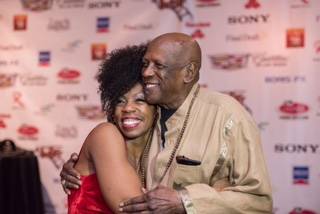Las Vegas’ ever-growing Black Film Festival set for April 27-30

In Hollywood, stars walk the red carpet. In Las Vegas, they walk the orange one.
That’s the favorite color of Michelle Payne-Boykin, the founder of the Black Film Festival, which is in its fourth year.
The film festival has long been a dream of its founder, who has credits as a producer, a director, an actress, a playwright, an author and a filmmaker.
“Being an African-American, upon graduating from college, I was told that I should look forward to a lot of ‘no’s,’ a lot of letdowns, a lot of rejection and a lot of ‘nowhere to go from heres,’ because of my ethnic background and being a woman,” Payne-Boykin said. “… It lit a fire under me.”
That fire led to the ever-growing film festival.
“We went from about 600 people (attending) our first year without any names attached to us to over 3,000 people last year in attendance,” Payne-Boykin said. “And we’re getting inquiries from networks, saying, ‘Hey, we want to be part of your workshops.’”
Inquires have come from representatives of Murphy Entertainment Studios (Eddie Murphy’s company), Black Entertainment Television (BET) and Netflix, she said.
The biggest obstacles to starting the festival were securing financing, getting the festival recognized, marketing and just getting the word out.
“I was able to educate myself and put together nice sponsorship packages so anyone who invested in me had answers to all their questions,” Payne-Boykin said.
Her advice to others who want to start a film festival: “Do the research you need and don’t take ‘no’ for an answer. The people who bought into my festival were buying into me. They were saying, ‘This lady is really passionate about what she’s doing, so I’m going to help her.’ They saw that with some support, I was going to make it happen.”
The most enjoyable element is being able to provide a platform for artists, actors and producers to showcase their work, Payne-Boykin said. She said it’s a way to provide an opportunity for those who may have heard the dream-bashing “you can’t do that” message like she did.
Payne-Boykin said hundreds of films are submitted each year, and she looks for solid context and a story line that is relatable to people.
Last year, Lamonte Faison went to the festival as a spectator. He has been in the filmmaking business about three years and likes doing urban dramas. He first full-length film, running 1:48, is “From the Inside Looking Out.” It premiered at a library for Black History Month, and he’d advised Payne-Boykin’s office but wasn’t expecting her to attend.
“Miss Michelle actually showed up. She saw it and told us on the spot, ‘I want it,’” Faison said. “We were ecstatic about it. We knew it was good; people around you are telling you it’s good, but you don’t really know it’s good until somebody on that level tells you, ‘Hey, I want that in my film festival.’”
“From the Inside Looking Out” is set to be shown at the festival at 6:30 p.m. on opening day, April 27.
If this was Topeka, would the festival have the same appeal?
“By this being the entertainment capital of the world, it does have some shine to it,” said William Boykin, vice president whose expertise includes the production end of the festival. “… There’s nowhere like Las Vegas.”
Contact Jan Hogan at jhogan@viewnews.com or 702-387-2949.